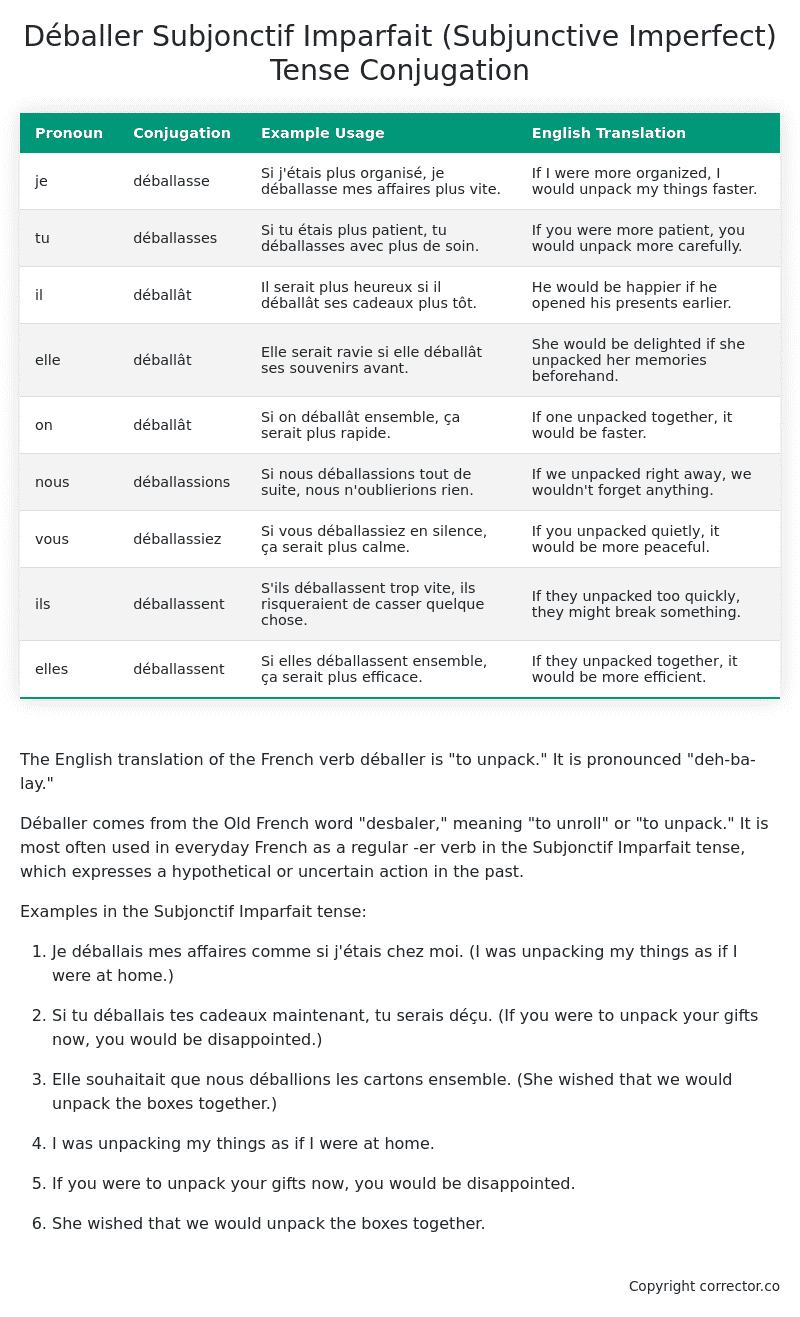Subjonctif Imparfait (Subjunctive Imperfect) Tense Conjugation of the French Verb déballer
Introduction to the verb déballer
The English translation of the French verb déballer is “to unpack.” It is pronounced “deh-ba-lay.”
Déballer comes from the Old French word “desbaler,” meaning “to unroll” or “to unpack.” It is most often used in everyday French as a regular -er verb in the Subjonctif Imparfait tense, which expresses a hypothetical or uncertain action in the past.
Examples in the Subjonctif Imparfait tense:
-
Je déballais mes affaires comme si j’étais chez moi. (I was unpacking my things as if I were at home.)
-
Si tu déballais tes cadeaux maintenant, tu serais déçu. (If you were to unpack your gifts now, you would be disappointed.)
-
Elle souhaitait que nous déballions les cartons ensemble. (She wished that we would unpack the boxes together.)
-
I was unpacking my things as if I were at home.
-
If you were to unpack your gifts now, you would be disappointed.
-
She wished that we would unpack the boxes together.
Table of the Subjonctif Imparfait (Subjunctive Imperfect) Tense Conjugation of déballer
| Pronoun | Conjugation | Example Usage | English Translation |
|---|---|---|---|
| je | déballasse | Si j’étais plus organisé, je déballasse mes affaires plus vite. | If I were more organized, I would unpack my things faster. |
| tu | déballasses | Si tu étais plus patient, tu déballasses avec plus de soin. | If you were more patient, you would unpack more carefully. |
| il | déballât | Il serait plus heureux si il déballât ses cadeaux plus tôt. | He would be happier if he opened his presents earlier. |
| elle | déballât | Elle serait ravie si elle déballât ses souvenirs avant. | She would be delighted if she unpacked her memories beforehand. |
| on | déballât | Si on déballât ensemble, ça serait plus rapide. | If one unpacked together, it would be faster. |
| nous | déballassions | Si nous déballassions tout de suite, nous n’oublierions rien. | If we unpacked right away, we wouldn’t forget anything. |
| vous | déballassiez | Si vous déballassiez en silence, ça serait plus calme. | If you unpacked quietly, it would be more peaceful. |
| ils | déballassent | S’ils déballassent trop vite, ils risqueraient de casser quelque chose. | If they unpacked too quickly, they might break something. |
| elles | déballassent | Si elles déballassent ensemble, ça serait plus efficace. | If they unpacked together, it would be more efficient. |
Other Conjugations for Déballer.
Le Present (Present Tense) Conjugation of the French Verb déballer
Imparfait (Imperfect) Tense Conjugation of the French Verb déballer
Passé Simple (Simple Past) Tense Conjugation of the French Verb déballer
Passé Composé (Present Perfect) Tense Conjugation of the French Verb déballer
Futur Simple (Simple Future) Tense Conjugation of the French Verb déballer
Futur Proche (Near Future) Tense Conjugation of the French Verb déballer
Plus-que-parfait (Pluperfect) Tense Conjugation of the French Verb déballer
Passé Antérieur (Past Anterior) Tense Conjugation of the French Verb déballer
Futur Antérieur (Future Anterior) Tense Conjugation of the French Verb déballer
Subjonctif Présent (Subjunctive Present) Tense Conjugation of the French Verb déballer
Subjonctif Passé (Subjunctive Past) Tense Conjugation of the French Verb déballer
Subjonctif Imparfait (Subjunctive Imperfect) Tense Conjugation of the French Verb déballer (this article)
Subjonctif Plus-que-parfait (Subjunctive Pluperfect) Tense Conjugation of the French Verb déballer
Conditionnel Présent (Conditional Present) Tense Conjugation of the French Verb déballer
Conditionnel Passé (Conditional Past) Tense Conjugation of the French Verb déballer
L’impératif Présent (Imperative Present) Tense Conjugation of the French Verb déballer
L’infinitif Présent (Infinitive Present) Tense Conjugation of the French Verb déballer
Struggling with French verbs or the language in general? Why not use our free French Grammar Checker – no registration required!
Get a FREE Download Study Sheet of this Conjugation 🔥
Simply right click the image below, click “save image” and get your free reference for the déballer Subjonctif Imparfait tense conjugation!

Déballer – About the French Subjonctif Imparfait (Subjunctive Imperfect) Tense
Formation
Common Everyday Usage Patterns
Interactions with Other Tenses
Subjonctif Présent
Indicatif Passé Composé
Conditional
Conditional Perfect
Summary
I hope you enjoyed this article on the verb déballer. Still in a learning mood? Check out another TOTALLY random French verb conjugation!


